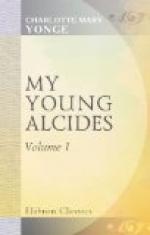“Tickets, eh?” he said, and he dreamily held one out to Harold and tried to get up, but he stumbled, and hardly seemed to understand when Harold told him it was not the station, but that they had run into the snowdrift; he only muttered something about being met, staggered forward, and fell into Harold’s arms. There was a carriage-bag on the seat, but Harold looked in vain there for a flask. The poor old man was hardly sensible. Ours was the nearest house, and Harold saw that the only chance for the poor old gentleman’s life was to carry him home at once. Even for him it was no small effort, for his burthen was a sturdy man with the solidity of years, and nearly helpless, save that the warmth of Harold’s body did give him just life and instinct to hold on, and let himself be bound to him with the long plaid so as least to impede his movements; but only one possessed of Harold’s almost giant strength could have thus clambered the cutting at the nearest point to Arghouse and plodded through the snow. The only wonder is that they were not both lost. Their track was marked as long as that snow lasted by mighty holes.
It was at about a quarter-past seven that all the dogs barked, a fumbling was heard at the door, and a muffled voice, “Let me in.”
Then in stumbled a heap of snow, panting, and amid Spitz’s frantic barks, we saw it was Harold, bent nearly double by the figure tied to him. He sank on his knee, so as to place his burthen on the great couch, gasping, “Untie me,” and as I undid the knot, he rose to his feet, panting heavily, and, in spite of the cold, bathed in perspiration.
“Get something hot for him directly,” he said, falling back into an arm-chair, while we broke out in exclamations. “Who—where did you find him? Some poor old beggar. Not too near the fire—call Richardson—hot brandy-and-water—bed. He’s some poor old beggar,” and such outcries for a moment or two, till Harold, recovering himself in a second, explained, “Snowed up in the train. Here, Lucy, Eustace, rub his hands. Dora, ask Richardson for something hot. Are you better now, sir?” beginning to pull off the boots that he might rub his feet; but this measure roused the traveller, who resisted, crying out, “Don’t, don’t, my good man, I’ll reward you handsomely. I’m a justice of the peace.”
Thick and stifled as it was, the voice was familiar. I looked again, and screamed out, “Lord Erymanth, is it you?”
That roused him, and as I took hold of both hands and bent over him, he looked up, dazzled and muttering, “Lucy, Lucy Alison! Arghouse! How came I here?” and then as the hot cordial came at last, in the hand of Richardson, who had once been in his service, he swallowed it, and then leant back and gazed at me as I went on rubbing his hands. “Thank you, my dear. Is it you? I thought I was snowed up, and I have never signed that codicil about little Viola, or I could die easily. It is not such a severe mode, after all.”




